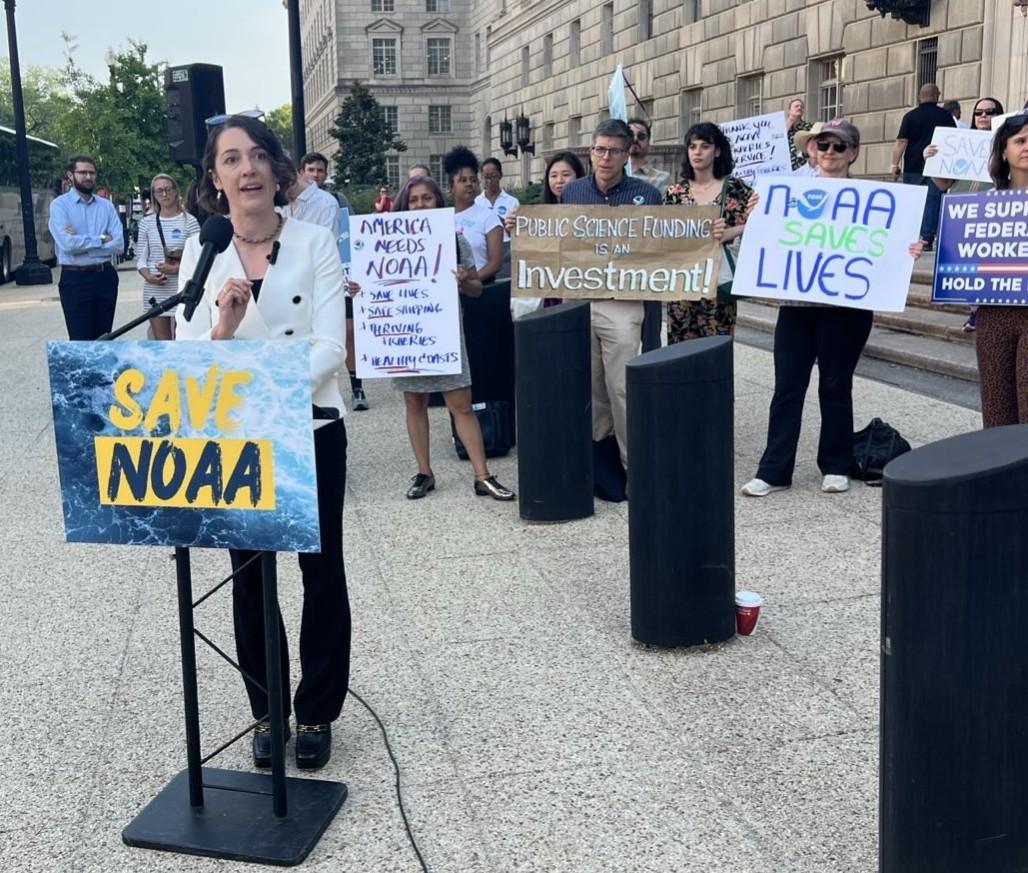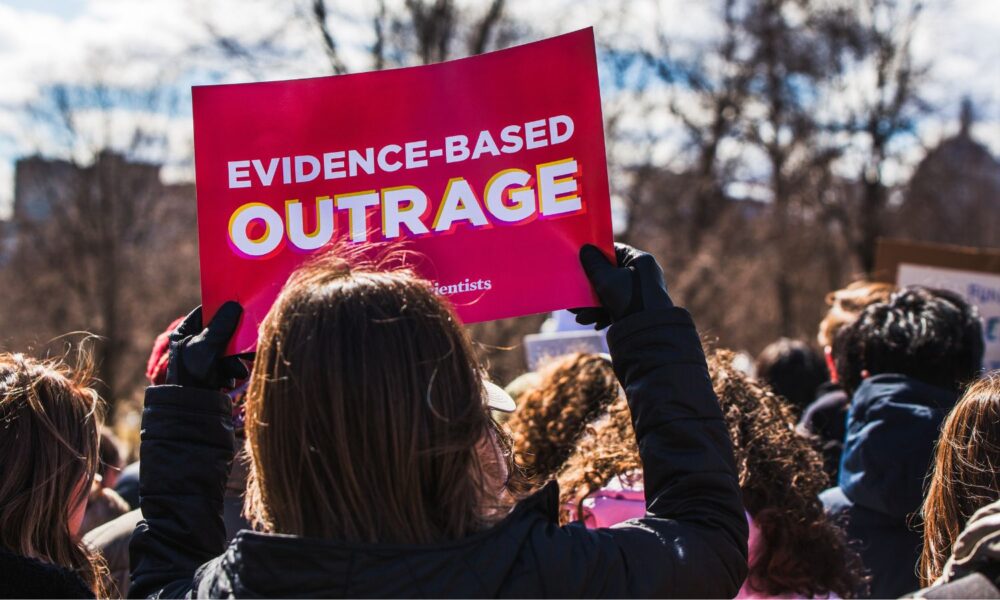For some of us, it may boggle the mind that it’s only been six months since President Trump was sworn back into office. His administration’s “flood the zone” tactics divide our attention and elevate our stress, making it difficult to keep tabs on the damages. But to quantify the many harms being done to people and the planet—both so that we can fight back, and keep a long view on opportunities to rebuild and re-envision the future—it’s important for my colleagues and I as scientists to document what’s happening.
You can find a detailed accounting of the past six months of Trump administration attacks on and abuses of science in our new report, Science and Democracy Under Siege. We’re clear-eyed about what we’re up against: the dismantling of federal agencies whose work protects the public, widespread rollbacks of health and safety protections, political cronyism, illegal power grabs, and withholding federal funds, among many other attacks.
The good news is that we have a blueprint for fighting back, which has guided our battles against the dangerously anti-science and anti-democratic actions of the Trump administration. I’m proud of how we’ve deployed it successfully to protect people, even in the face of a relentless assault on our work and values. With the goals of minimizing the damage done, continuing to make progress on our issues in the near term, and creating the conditions for progress in the years and decades ahead, UCS is fighting smart.
Uniting the scientific community
Among our strengths as an organization is our ability to amplify the political power of the scientific community. Over the past months, we’ve welcomed hundreds of new members into our Science Network, a group of nearly 20,000 scientists and technical experts ready to act on opportunities to push back against the administration.
Weeks after the inauguration, UCS organized a sign-on letter to Congress demanding that federal science be protected, signed by 56 scientific societies representing more than 100,000 scientists across disciplines. And as the National Oceanic and Atmospheric Administration (NOAA) faced unprecedented budget cuts and mass firings that hindered their crucial work keeping the public safe from extreme weather events, UCS helped organize and send a letter to Congress signed by over 3,300 scientists from around the world in defense of the agency. The letter has been cited in the media and used by members of Congress. To challenge cuts at the Environmental Protection Agency’s Office of Research and Development, we organized a letter to Congress signed by more than 120 environmental, public health, science and community organizations, and businesses.
UCS also created a video campaign highlighting the importance of a robust scientific enterprise in our society, along with a tool to contact members of Congress. Several scientific societies, including 500 Women Scientists, and UCS National Advisory Board member Bill Nye shared the video on their social media.
We’ve also been at the forefront of a wave of rallies and mass mobilization events, beginning with the Stand Up for Science flagship rally in Washington, DC, where I spoke to the crowd about the importance of federal science. UCS staff have supported and participated in the Hands Off! and No Kings rallies and marches. And as Trump administration officials filed into NOAA offices for an annual fish fry last month, I was outside loudly addressing a rally of supporters, pointing out how cuts to NOAA were hurting people.

Driving the narrative
Early on, we knew that we couldn’t let the Trump administration’s false claims about federal science and its funding dominate news cycles. Instead, we’ve made it clear to our supporters and the national media that the anti-science actions of the Trump administration are causing direct harm to people and communities—and are further evidence of the administration’s incompetent and illegal behavior
We’re focused on a core message: that when science is sidelined, people get hurt. In addition to our new report Science and Democracy Under Siege, we release regular updates of attacks on science to make sense of this harmful and chaotic news environment and to highlight examples of specific communities that are affected. We must drive home the point that real people are at risk. UCS experts are in the New York Times, on Instagram, featured on NPR and in local news outlets across the country explaining why budget cuts, mass firings, and anti-science policies are bad for our health and safety. With more than 4,000 mentions of UCS work citing the Trump administration and its destructive actions in national media outlets in a four-month period from January to April 2025, people are listening.
Pushing our lawmakers
Beyond the Trump administration, members of Congress are still responsible for managing federal budgets and passing legislation that will help their constituents. UCS works directly with members of Congress on both sides of the aisle on our priorities, and encourages our members and supporters to contact their elected officials to protect science.
For example, UCS played a key role in securing a major bipartisan victory this month. We worked to cultivate bipartisan support for extending and expanding the Radiation Exposure Compensation Act (RECA) for years. RECA provides support to people and communities exposed to radiation from US nuclear weapons activities. The legislation expired last year, leaving thousands wondering how to pay their healthcare bills. UCS staff helped bring organizers from these affected communities to meet with their members of Congress to ask them to revive and expand RECA. This summer, Congress passed the largest RECA expansion in history—not just reinstating the law, but expanding it to cover more survivors.
UCS has also organized in-district meetings for our supporters, and provided resources to show the local economic impacts of federal attacks on science. And for UCS supporters who plan to attend town hall-style meetings hosted by their members of Congress, we created a toolkit and offered virtual trainings to help them engage on the issues they care about.
Holding the line
UCS is operating defensively against the Trump administration’s assaults, with the intention of stopping, slowing, and derailing its efforts to dismantle federal science agencies and cut their funding. The alarms we’ve raised over potential cuts and proposals to radically restructure agencies like NOAA, its National Weather Service, and the Federal Emergency Management Agency have had an effect, with some of the worst effects paused or on hold. And we’re using our public profile to raise concerns with the current nomination of Neil Jacobs—who was found to be in violation of NOAA’s scientific integrity policy for his role in ‘Sharpiegate’ during the first Trump administration, politicizing data on Hurricane Dorian and throwing his own scientists under the bus. We’re continuing to fight for NOAA, including hosting a day of meetings with lawmakers this week, and a virtual “action hour” training for scientists and experts July 29.
UCS has also been working to mobilize the scientific community against President Trump’s decree on science-based decisionmaking in government, the deceptively named “Gold Standard Science” executive order. Under this order, political appointees could use these standards to choose what science (including pseudoscience) their agencies are allowed to consider when setting policies. My colleague Jules Barbati-Dajches and I published an opinion piece in The BMJ rallying scientists to disrupt this attack on independent science, and we’re keeping up a drumbeat in the media and among our supporters.
We’ve also gone on the offense: UCS filed a lawsuit via the Campaign Legal Center against the so-called Department of Government Efficiency (DOGE) for acting beyond its constitutional power to slash federal funding, dismantle federal agencies, and fire federal employees. Our suit was combined with a similar case filed by 14 states, and in May, a federal judge ruled that it can proceed in court. We joined another suit challenging the Trump administration’s removal of public information from climate and environmental justice federal agency websites—some of whose data we’re hosting on our own site, so it won’t disappear.
And for federal scientists—those who have been forced out of their positions, and those who remain—we’re providing support, connections, and resources.
Making progress where possible
Let’s be clear: progress on UCS issues is still possible—and it’s happening. The state of Maine just provided a great example, as its legislature and governor approved a bill requiring the state’s power to come from 100% carbon-free electricity sources by 2040, saving ratepayers money and cleaning up polluting and heat-trapping emissions from power generation. UCS staff rallied support for the law by testifying at hearings, promoting a lobby day, and working with local partners.
Across the country, we have strong working relationships with state agencies and legislatures that help us make similar progress on our issues, including in California, where we’re working to strengthen policies around electric vehicle adoption, and in the Midwest, where we work with electrical grid operators and consumers to help boost renewable energy use.
And as the Trump administration disbands crucial scientific advisory committees whose members provide expert advice on federal protections and safeguards, we’ve released a toolkit to help any interested experts convene their own independent science advisory committees. In the absence of federal leadership, independent committees can create an opportunity for public input on critical scientific topics, help counter misinformation in the public sphere, and allow scientific progress and consensus building to continue. These committees can also provide scientific advice for decisionmakers at other levels of government, including in states, and prepare recommendations for future decisions when the opportunity arises.
While we lay the groundwork for future progress, we’re working to garner support for a law that will protect scientific integrity across the federal government, ensuring that federal science and scientists are properly protected from inappropriate political influence in current and future presidential administrations. Indeed, we’re hosting events with members of Congress and UCS supporters this week to advocate for the Scientific Integrity Act’s passage.
Staying in the fight
For those of us who care about a functional democracy, the preservation of human rights, fighting climate change, environmental justice, protecting public health, and our environment, the past six months have been hellish. If you’re tired, overwhelmed, drained, dispirited by the torrent of bad news and worse policy announcements, depressed, angry, or some combination of all of these—I’m right there with you, and so are my colleagues at UCS. Our six-month report thoroughly lays out the brutal toll this administration’s actions have taken on the issues we care most about.
But what we’re fighting for is worth the effort. UCS is staying in the ring, tracking and resisting the Trump administration’s worst attacks with every tool in our arsenal, and making all the progress toward our goals that we can. And as a parent who (like all parents) is deeply invested in my children’s safe and healthy future, I can promise you that we will never stop imagining and fighting for the better world we know is possible.

